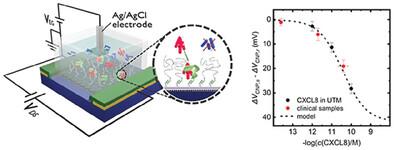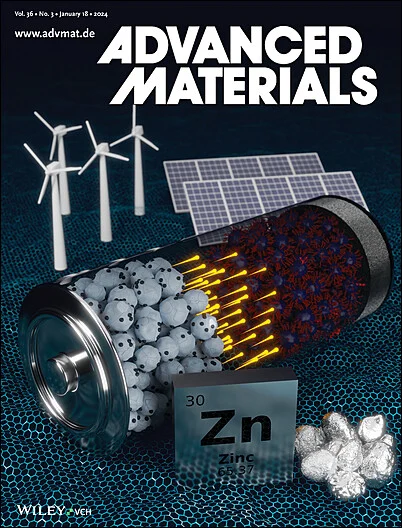Ultrasensitive Detection of Chemokines in Clinical Samples with Graphene-Based Field-Effect Transistors
IF 27.4
1区 材料科学
Q1 CHEMISTRY, MULTIDISCIPLINARY
引用次数: 0
Abstract
Due to their ultra-high sensitivity, solution-gated graphene-based field-effect transistors (SG-GFET) have been proposed for applications in bio-sensing. However, challenges regarding the functionalization of GFETs have prevented their applications in clinical diagnostics so far. Here GFET sensors based on van der Waals (vdW) heterostructures of single-layer graphene layered with a molecular ≈1 nm thick carbon nanomembrane (CNM) are presented. The CNM acts as an ultrathin molecular interposer between the graphene channel and the analyte and allows bio-functionalization without impairing the graphene properties including its charge carrier mobility. To achieve specificity and reliability in the detection of biomarkers in real patient samples, the functionalization incorporates biostable aptamers in the non-natural l-configuration and hydrophilic polyethylene glycol for avoiding non-specific adsorption. A rapid (≈5 min) detection of the clinically relevant inflammatory mediator CXCL8/IL-8 within the concentration range of 0.5 – 500 pM (5 – 5000 pg ml−1) is demonstrated in nasal swab samples collected from patients with respiratory tract infections. This detection range may aid in diagnostics of early-stage infectious diseases making the reported approach promising for the development of future medical tools.

利用石墨烯基场效应晶体管超灵敏检测临床样本中的趋化因子
由于具有超高灵敏度,溶液门控石墨烯基场效应晶体管(SG-GFET)已被提议应用于生物传感领域。然而,GFET 功能化方面的挑战使其至今无法应用于临床诊断。本文介绍了基于范德华(vdW)异质结构的 GFET 传感器,这种异质结构由单层石墨烯与分子厚度≈1 nm 的碳纳米膜(CNM)层叠而成。CNM 可作为石墨烯通道和分析物之间的超薄分子插层,在不影响石墨烯特性(包括其电荷载流子迁移率)的情况下实现生物功能化。为了在实际患者样本中实现生物标记物检测的特异性和可靠性,功能化过程中加入了非天然 l 构型的生物稳定适配体和亲水性聚乙二醇,以避免非特异性吸附。在从呼吸道感染患者采集的鼻拭子样本中,可以在 0.5 - 500 pM(5 - 5000 pg ml-1)的浓度范围内快速(≈5 分钟)检测出临床相关的炎症介质 CXCL8/IL-8。这一检测范围有助于早期传染病的诊断,因此报告的方法有望用于未来医疗工具的开发。
本文章由计算机程序翻译,如有差异,请以英文原文为准。
求助全文
约1分钟内获得全文
求助全文
来源期刊

Advanced Materials
工程技术-材料科学:综合
CiteScore
43.00
自引率
4.10%
发文量
2182
审稿时长
2 months
期刊介绍:
Advanced Materials, one of the world's most prestigious journals and the foundation of the Advanced portfolio, is the home of choice for best-in-class materials science for more than 30 years. Following this fast-growing and interdisciplinary field, we are considering and publishing the most important discoveries on any and all materials from materials scientists, chemists, physicists, engineers as well as health and life scientists and bringing you the latest results and trends in modern materials-related research every week.
 求助内容:
求助内容: 应助结果提醒方式:
应助结果提醒方式:


